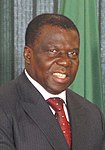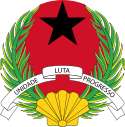|
2005 Guinea-Bissau presidential election
Presidential elections were held in Guinea-Bissau on 19 June 2005, with a second round runoff on 24 July. The elections marked the end of a transition to democratic rule after the previously elected government was overthrown in a September 2003 military coup led by General Veríssimo Correia Seabra. The result was a victory for former president and independent candidate João Bernardo Vieira. BackgroundFollowing the coup, a civilian government was nominated to oversee the transition and sworn in on 28 September 2003. Henrique Rosa was appointed interim President following talks with military, political, and civil society leaders, while Artur Sanhá of the Party for Social Renewal (PRS) was named Prime Minister. A legislative election, delayed numerous times during the presidency of Kumba Ialá, took place on 28 March 2004. The poll was declared free and fair by election observers and the former ruling party, the African Party for the Independence of Guinea and Cape Verde (PAIGC), won a plurality of the seats. Ialá's party, the PRS, placed second, followed by the United Social Democratic Party (PUSD). PAIGC leader Carlos Gomes Júnior took office as Prime Minister in May 2004. The transitional period has been one of increased political and national stability. The caretaker government has managed to improve Guinea-Bissau's human rights record, as evidenced in the most recent U.S. State Department Country Reports on Human Rights Practices entry for Guinea-Bissau (released 28 February 2005, which says "The [Transitional] Government generally respected the human rights of its citizens; however, there were problems in some areas". The previous report (released 25 February 2004) stated "The [Ialá] Government's human rights record remained poor, and it continued to commit serious abuses". The biggest threat to stability came on 6 October 2004 when a mutiny by soldiers—instigated by unpaid wages—turned violent. General Veríssimo Correia Seabra and his lieutenant were killed by the revolting soldiers. Despite this setback, the tense relations between the government and the military improved with the signing of a memorandum of understanding. CandidatesOn 10 May 2005, the Supreme Court published a list of candidates that will contest the election. Three previously barred candidates were allowed to contest the poll and appeared on the final list of candidates published on 18 May. The 13 candidates are:
Diplomats and political analysts say that the participation of the two ex-presidents Vieira and Ialá may exacerbate tensions among ethnic groups and the military that could destabilize the country. Ex-President Vieira has a troubled relationship with the armed forces. Ex-President Ialá, on the other hand, has a very poor reputation among potential donor countries and financial institutions, with the International Monetary Fund and World Bank freezing aid to the country during his presidency. He has a considerable amount of support from the Balanta ethnic group which dominates the military, but has little support from the other groups. There are unconfirmed reports of the establishment of armed groups along ethnic lines in Bissau. Four candidates who were approved to contest the election withdrew in the weeks leading up to the poll; Abubacar Baldé of the UNDP, Iancuba Indjai of the PST (who subsequently declared his support for Malam Bacai Sanhá), independent candidate Ibraima Sow (who backed Vieira) and Salvador Tchongó of the RGB-MB. CampaignOn 2 July Ialá announced his support for Vieira's candidacy in the second round runoff. He called Vieira "a symbol of the construction of the Guinean state and of national unity because he proclaimed our independence in the hills of Boe" and said that he could "be relied upon to defend our national independence, to oppose neo-colonialism, to build the republic and promote peace, stability and above all, national reconciliation". Given Ialá's sharp hostility to Vieira in previous years, this endorsement was viewed as surprising by many, and there was reportedly significant dissatisfaction with the decision among Ialá's supporters.[1] It has been alleged that Vieira's re-election campaign was partly funded by Colombian drug dealers, who use Guinea-Bissau as a transit route to transport drugs to Europe.[2] ConductVoting took place peacefully in the first round on 19 June. Chief EU election monitor Johan Van Heck said his group noted no major irregularities, adding, "We have the impression that throughout the country everyone has had the chance to express themselves without being intimidated." The next day, Van Heck praised the fact that "the military forces abstained from intervening in the process and rather helped the conduct of the election." The EU observer added, "More than 90 percent of the polling stations were fully operational an hour after they had opened, and the secret ballot was guaranteed." On 22 June, provisional tallies put Sanhá in first place, followed by Vieira and Ialá in third. Members of Ialá's Party for Social Renewal (PRS) deemed the results "false". Two days later, at least two people died when police fired tear gas and live bullets at a crowd of Ialá supporters, who were protesting the released results. Beginning on 25 June, Senegalese President Abdoulaye Wade held separate meetings with the three main candidates; Wade said that he was mediating at the request of the Economic Community of West African States (ECOWAS) and was not interfering in Guinea-Bissau's affairs. Kumba Ialá, speaking at a press conference in Dakar on 27 June, accepted the results "in the interests of peace and stability", although he still maintained that he had actually received the most votes. According to Ialá, he won 38%, Sanhá won 28%, and Vieira won 26%; he alleged that the votes were manipulated so that his total went to Sanhá and Sanhá's total went to Vieira. Also on 27 June, Vieira promised to "respect the verdict of the ballot boxes", as did Sanhá, who described himself as "a man of peace and stability".[3] ResultsFinal results of the first round were released on 25 June. Malam Bacai Sanhá received 35.45% of the vote, João Bernardo "Nino" Vieira won 28.87%, and Kumba Ialá 25.00%.[3] Ten other candidates split the remaining votes. Electoral commission head Malam Mané made "a strong appeal for moderation and public-spiritedness." Voter turnout for the first round was placed at 87.3%. On July 28, the electoral commission reported that Vieira had garnered 20,000 vote more than Sanhá in run-off voting, however, the results were "provisional" since the PAIGC demanded a recount, citing irregularities in the capital and in the west. After the provisional results were announced, Vieira praised his rival Sanha, called him a democrat and said he hoped he would help unify the country; he also vowed that "from today, Guinea-Bissau will change in the right direction". A spokesman for Sanha alleged fraud, however.[4]
References
Further reading
External links
|
||||||||||||||||||||||||||||||||||||||||||||||||||||||||||||||||||||||||||||||||||||||||||||||||||||||||||||||||||||||||||||||||||||||||||||||||||||||||||||||||||||||||||||||||||||||||||||||||||
Portal di Ensiklopedia Dunia




